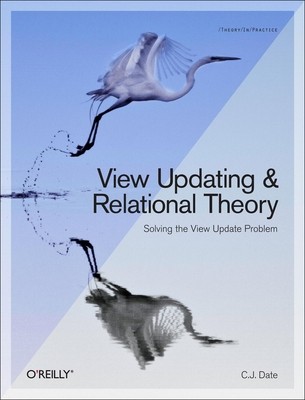
- We will send in 10–14 business days.
- Author: Chris J Date
- Publisher: O'Reilly Media
- Year: 2012
- Pages: 260
- ISBN-10: 1449357849
- ISBN-13: 9781449357849
- Format: 17.9 x 23 x 1.5 cm, minkšti viršeliai
- Language: English
- SAVE -10% with code: EXTRA
Reviews
Description
Views are virtual tables. That means they should be updatable, just as "real" or base tables are. In fact, view updatability isn't just desirable, it's crucial, for practical reasons as well as theoretical ones. But view updating has always been a controversial topic. Ever since the relational model first appeared, there has been widespread skepticism as to whether (in general) view updating is even possible.
In stark contrast to this conventional wisdom, this book shows how views, just like base tables, can always be updated (so long as the updates don't violate any integrity constraints). More generally, it shows how updating always ought to work, regardless of whether the target is a base table or a view. The proposed scheme is 100% consistent with the relational model, but rather different from the way updating works in SQL products today.
This book can:
- Help database products improve in the future
- Help with a "roll your own" implementation, absent such product improvements
- Make you aware of the crucial role of predicates and constraints
- Show you how relational products are really supposed to behave
Anyone with a professional interest in the relational model, relational technology, or database systems in general can benefit from this book.
EXTRA 10 % discount with code: EXTRA
The promotion ends in 22d.20:01:45
The discount code is valid when purchasing from 10 €. Discounts do not stack.
- Author: Chris J Date
- Publisher: O'Reilly Media
- Year: 2012
- Pages: 260
- ISBN-10: 1449357849
- ISBN-13: 9781449357849
- Format: 17.9 x 23 x 1.5 cm, minkšti viršeliai
- Language: English English
Views are virtual tables. That means they should be updatable, just as "real" or base tables are. In fact, view updatability isn't just desirable, it's crucial, for practical reasons as well as theoretical ones. But view updating has always been a controversial topic. Ever since the relational model first appeared, there has been widespread skepticism as to whether (in general) view updating is even possible.
In stark contrast to this conventional wisdom, this book shows how views, just like base tables, can always be updated (so long as the updates don't violate any integrity constraints). More generally, it shows how updating always ought to work, regardless of whether the target is a base table or a view. The proposed scheme is 100% consistent with the relational model, but rather different from the way updating works in SQL products today.
This book can:
- Help database products improve in the future
- Help with a "roll your own" implementation, absent such product improvements
- Make you aware of the crucial role of predicates and constraints
- Show you how relational products are really supposed to behave
Anyone with a professional interest in the relational model, relational technology, or database systems in general can benefit from this book.


Reviews